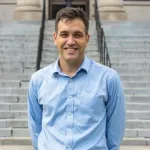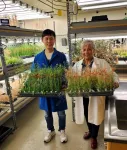(Press-News.org) Routinely referring patients to a tailored programme of physiotherapy after a dislocated shoulder is no better than a single session of advice, supporting materials and the option to self-refer to physiotherapy, finds a clinical trial published by The BMJ today.
The findings should help clinicians and patients have informed discussions about the best approach to non-operative rehabilitation, say the researchers.
The shoulder is the most frequently dislocated joint, with rates highest in men aged 16-20 years (805 per 100,000 person years) due to sporting injuries and in women aged 61-70 years (28 per 100,000 person years) due to falls.
Non-operative management is the most common treatment after a first dislocation. This can range from an advice sheet only to a programme of individually tailored physiotherapy over several months, but no previous trial evidence is available to inform the best approach.
To explore this further, researchers set out to assess the effects of two rehabilitation interventions in adults with a first time traumatic shoulder dislocation at 40 NHS hospitals across the UK between November 2018 and March 2022.
All participants (66% male; average age 45 years) initially had their arm supported in a sling and received a physiotherapy advice session within six weeks of their injury, which included a shoulder examination plus advice and support materials to aid self-management.
After this session, 240 participants were randomly assigned to advice only (no further treatment) and 242 were offered additional physiotherapy sessions, each lasting for up to 30 minutes over four months.
The main measure of interest was shoulder function on the Oxford shoulder instability score (a 0-48 point scale) reported by patients after six months.
No clinically relevant differences in shoulder scores were found between the two groups at six months or in other measures, including a questionnaire on physical function of the arm, shoulder and hand. Complications were also similar across the two groups
This is the largest trial on the topic to date, although the researchers acknowledge that just over a quarter of participants were lost to follow up. However, further analysis, accounting for missing data, gave similar results, providing reassurance that the conclusions are robust.
As such they say, until now, no strong evidence was available to guide rehabilitation management following an initial two weeks support in a sling. “We now know an additional programme of individually tailored physiotherapy is not superior to advice, supporting materials, and an option to self-refer to physiotherapy.”
“Knowing that an individually tailored programme of physiotherapy is not superior will enable clinicians and patients to have evidenced informed discussions about the best approach to non-operative rehabilitation,” they conclude.
This randomised clinical trial was well planned, executed, and reported, say researchers in a linked editorial.
The results show that physiotherapy-led rehabilitation, including generalised range of movement and strengthening exercises (mainly below shoulder height), plus patient advice, confers minimal advantage over advice and education alone.
However, they say caution is needed when extrapolating these results, particularly concerning younger patients wishing to return to sports, occupations, or activities with high shoulder loads.
END
No benefit of physiotherapy over general advice after dislocated shoulder
Findings should help inform discussions about the best approach to rehabilitation
2024-01-18
ELSE PRESS RELEASES FROM THIS DATE:
Concerns over new laws that could end use of Whatsapp in the NHS
2024-01-18
UK law changes pose a threat to the security of messaging apps – and therefore their use in the NHS. In The BMJ today, doctors warn that patient care will suffer if they can no longer use apps such asWhatsApp and Signal to share information.
In March 2020, in the face of the pandemic, clinicians were officially allowed to use messaging services such as WhatsApp “where the benefits outweigh the risk,” reversing years of caution about their use in patient care – provided ...
Fewer than 1% of schools in England have full policies on second languages, language learning and English
2024-01-18
A tiny fraction of schools in England – about three in every 500 – have whole-school policies which address foreign languages, English usage, and integrating students who speak English as an additional language (EAL), new research indicates.
The study of almost 1,000 secondary schools, by researchers at the University of Cambridge, questions many schools’ claims to being ‘inclusive’ spaces that value the linguistic diversity of their communities. It also suggests that language learning, and an appreciation of different languages, is being deprioritised, conflicting with Government ambitions for 90% of students to study a ...
Butterflies could lose spots as climate warms
2024-01-18
Female Meadow Brown butterflies have fewer spots if they develop in warmer weather – so climate change could make them less spotty, new research shows.
University of Exeter scientists found females that developed at 11°C had six spots on average, while those developing 15°C had just three.
The findings challenge long-held scientific views about why these butterflies have varying numbers of spots.
“Meadow Browns always have large ‘eyespots’ on their forewings, probably for startling predators,” said Professor Richard ffrench-Constant, from the Centre for Ecology and Conservation on Exeter’s Penryn Campus in Cornwall.
“They ...
Infusion of bone marrow mononuclear cells results in decreased intensive care needs and white matter preservation for children with severe traumatic brain injury
2024-01-18
After children experienced severe traumatic brain injury, the infusion of bone marrow mononuclear cells derived from the patient’s own bones led to less time spent in intensive care, less intense therapy, and, significantly, the structural preservation of white matter, which constitutes about half the total volume of the brain, according to new research from UTHealth Houston.
The study, published recently in the medical journal Brain, was based on the results of a Phase II clinical trial led by first author Charles S. Cox Jr., MD, the George and Cynthia Mitchell Distinguished Chair in Neurosciences and the Glassell Family Distinguished Chair in the ...
National award goes to Sandia Labs engineer
2024-01-18
ALBUQUERQUE, N.M. — Tony Garcia often reflects on his grandfather’s words: “Work hard and be good to people, and you’ll end up happy.”
This simple principle has been Garcia’s beacon throughout his academic and professional journeys, and now has led to his recognition with a prestigious 2023 Society of Hispanic Professional Engineers STAR of Today award for technical achievement.
The STAR awards recognize individuals in STEM who are not only excelling in their fields but also making a significant impact through their work, research ...
Researchers make links between woolly mammoths and colonization of the Americas
2024-01-17
Imagine journeying back in time to the era of woolly mammoths, some 14,000 years ago. That’s what a team of international researchers from the University of Ottawa, the University of Alaska Fairbanks, McMaster University and Adelphi University, and Indigenous scholars, managed to do. Using novel high-resolution isotope profiling (a sort of “paleo-GPS”), they were able to connect the dots between the wanderings of a woolly mammoth and the earliest known human settlements in the remote ...
Governor Hochul announces CUNY to receive $75 million from the Simons Foundation, largest donation in university history
2024-01-17
Governor Kathy Hochul today announced that the City University of New York is receiving $75 million from the Simons Foundation, the University’s largest-ever donation. The gift earmarks $50 million to establish CUNY as a hub for computational science and $25 million to support CUNY’s participation in the Governor’s proposed Empire AI project. Computational science uses programming techniques to solve problems in fields such as biology, astrophysics and neuroscience.
“For many New Yorkers, higher education is critical to pursuing a career ...
Keys to aging hidden in the leaves
2024-01-17
Scientists have known about a particular organelle in plant cells for over a century. However, UC Riverside scientists have only now discovered that organelle’s key role in aging.
The researchers initially set out to understand more generally which parts of plant cells control plant responses to stress from things like infections, too much salt, or too little light. Serendipitously, they found this organelle, and a protein responsible for maintaining the organelle, control whether plants survive being left too often in the dark.
Because they had not expected this discovery, which is ...
Rain can spoil a wolf spider’s day, too
2024-01-17
If you hate the rain, you have something in common with wolf spiders.
Researchers at the University of Cincinnati found that wolf spiders can’t signal others or perceive danger from predators as easily on rain-soaked leaves compared to dry ones. Even communicating with would-be mates is harder after it rains.
The study was published in the Journal of Insect Behavior.
Biologists in UC’s College of Arts and Sciences studied Schizocosa ocreata, a wolf spider found across much of the United States. Males respond to chemical signals from females by using a combination of visual ...
Independent dispute resolution of no surprises act financially unviable for radiology
2024-01-17
Leesburg, VA, January 17, 2024—According to the American Journal of Roentgenology (AJR), the No Surprises Act’s (NSA) independent dispute resolution (IDR) process would be financially unfeasible for a large portion of out-of-network (OON) claims for hospital-based specialties—more so for radiologists than other specialists.
“Although the NSA enacted important patient protections, IDR fees limit clinicians’ opportunities to dispute payer-determined payments and potentially undermine their bargaining power in contract negotiations,” ...
LAST 30 PRESS RELEASES:
Pekingese, Shih Tzu and Staffordshire Bull Terrier among twelve dog breeds at risk of serious breathing condition
Selected dog breeds with most breathing trouble identified in new study
Interplay of class and gender may influence social judgments differently between cultures
Pollen counts can be predicted by machine learning models using meteorological data with more than 80% accuracy even a week ahead, for both grass and birch tree pollen, which could be key in effective
Rewriting our understanding of early hominin dispersal to Eurasia
Rising simultaneous wildfire risk compromises international firefighting efforts
Honey bee "dance floors" can be accurately located with a new method, mapping where in the hive forager bees perform waggle dances to signal the location of pollen and nectar for their nestmates
Exercise and nutritional drinks can reduce the need for care in dementia
Michelson Medical Research Foundation awards $750,000 to rising immunology leaders
SfN announces Early Career Policy Ambassadors Class of 2026
Spiritual practices strongly associated with reduced risk for hazardous alcohol and drug use
Novel vaccine protects against C. diff disease and recurrence
An “electrical” circadian clock balances growth between shoots and roots
Largest study of rare skin cancer in Mexican patients shows its more complex than previously thought
Colonists dredged away Sydney’s natural oyster reefs. Now science knows how best to restore them.
Joint and independent associations of gestational diabetes and depression with childhood obesity
Spirituality and harmful or hazardous alcohol and other drug use
New plastic material could solve energy storage challenge, researchers report
Mapping protein production in brain cells yields new insights for brain disease
Exposing a hidden anchor for HIV replication
Can Europe be climate-neutral by 2050? New monitor tracks the pace of the energy transition
Major heart attack study reveals ‘survival paradox’: Frail men at higher risk of death than women despite better treatment
Medicare patients get different stroke care depending on plan, analysis reveals
Polyploidy-induced senescence may drive aging, tissue repair, and cancer risk
Study shows that treating patients with lifestyle medicine may help reduce clinician burnout
Experimental and numerical framework for acoustic streaming prediction in mid-air phased arrays
Ancestral motif enables broad DNA binding by NIN, a master regulator of rhizobial symbiosis
Macrophage immune cells need constant reminders to retain memories of prior infections
Ultra-endurance running may accelerate aging and breakdown of red blood cells
Ancient mind-body practice proven to lower blood pressure in clinical trial
[Press-News.org] No benefit of physiotherapy over general advice after dislocated shoulderFindings should help inform discussions about the best approach to rehabilitation





